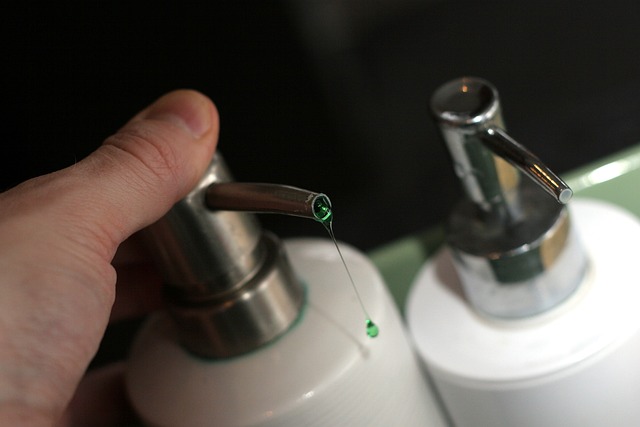Smooth and Radiant: The Science of Skincare and Personalized Beauty Routines
The article explains that skincare products containing hyaluronic acid, retinoids, antioxidants lik…….

The article explains that skincare products containing hyaluronic acid, retinoids, antioxidants like vitamin C, and niacinamide can significantly improve skin smoothness and radiance. These ingredients help with hydration, protecting against environmental damage, brightening the skin, promoting collagen production, and diminishing signs of aging. A personalized skincare regimen based on individual skin types—such as dry, oily, sensitive, or acne-prone—is crucial for optimal results. For example, hydrating agents and nourishing oils are beneficial for dry skin, while salicylic acid and tea tree oil target oily skin. Regular use of these products over time allows their active ingredients to penetrate and work effectively. A well-rounded skincare routine should include gentle cleansers, antioxidants, moisturizers, sunscreens, and treatments that address specific skin concerns while maintaining the skin's natural barrier function for long-term health and radiance. Consistent, tailored usage of these products is key to achieving healthy, smooth, and radiant skin.
Explore the intersection of beauty and science in our latest article, where we unravel the mysteries surrounding beauty products’ effects on skin smoothness and radiance. Delve into the transformative power of skincare tailored to individual skin types, as we examine the ingredients that promise a glowing visage. From the hydrating properties of glycerin to the exfoliating benefits of alpha-hydroxy acids, discover which products can elevate your complexion. We’ll also delve into the importance of consistent application and the role of product formulation in maintaining healthy skin. Expert insights will guide you through crafting a daily regimen that aligns with your skin’s unique needs, ensuring you achieve the luminous and smooth skin you desire. Join us as we debunk myths and highlight facts to enhance your skincare routine effectively.
- Assessing the Impact of Beauty Products on Skin Smoothness and Radiance
- Ingredients Key to Achieving Smoother and More Radiant Skin
- Tailoring Skincare by Skin Type for Optimal Results
- The Role of Consistency and Product Formulation in Skin Health
- Expert Recommendations for Daily Beauty Regimens
Assessing the Impact of Beauty Products on Skin Smoothness and Radiance

The impact of beauty products on skin smoothness and radiance is a subject of considerable interest and debate among consumers and dermatologists alike. To accurately assess how these products influence skin texture and luminosity, it’s crucial to consider the formulation and ingredients of the products in question. High-quality skincare formulations often contain active ingredients known for their skin-enhancing properties, such as hyaluronic acid for hydration, retinoids for cell turnover, and antioxidants like vitamin C to protect against environmental stressors. These components can visibly improve skin smoothness by fortifying the skin barrier, encouraging the production of collagen, and reducing the appearance of fine lines and wrinkles.
Additionally, products designed to enhance radiance typically include ingredients that promote a healthy skin tone and texture, such as fruit enzymes for gentle exfoliation or light-reflecting minerals that create a ‘glow’ effect. For instance, niacinamide is an ingredient that can help to brighten the complexion while also improving skin elasticity. It’s important to tailor skincare routines according to one’s specific skin type, as what works for one individual may not be suitable for another. For example, those with dry skin may benefit from richer moisturizers and oils, while those with oily skin might opt for gel-based or water-cream formulations that provide hydration without contributing to oiliness. By selecting products appropriate for their skin type and by incorporating a consistent skincare routine, individuals can expect to see measurable improvements in skin smoothness and radiance over time. It’s also recommended to introduce new products gradually and to be patient with the results, as the skin may take several weeks to adjust and respond positively to new treatments.
Ingredients Key to Achieving Smoother and More Radiant Skin

When seeking products to enhance skin smoothness and radiance, understanding the key ingredients is paramount. Hyaluronic acid, a naturally occurring moisture magnet within the skin, is renowned for its ability to plump and smooth the complexion. It draws and retains moisture from the environment, keeping the skin hydrated and supple. For those with dry or dehydrated skin, ingredients like glycerin and ceramides further support the skin’s barrier, restoring and maintaining its natural moisture levels.
Antioxidants such as vitamin C and E are also integral in promoting a radiant complexion. Vitamin C is effective in brightening the skin and protecting against environmental damage by neutralizing free radicals. It can stimulate collagen production, leading to a firmer and more youthful appearance. Vitamin E, on the other hand, is a powerful antioxidant that works synergistically with vitamin C to protect the skin from oxidative stress. Together, these vitamins can visibly improve skin tone and texture, contributing to a healthier-looking complexion.
For individuals with oily or combination skin, it’s important to look for products containing salicylic acid or beta hydroxy acids (BHAs). These ingredients help unclog pores, regulate sebum production, and exfoliate the skin gently, leading to a smoother and clearer complexion. Additionally, niacinamide, a form of vitamin B3, is beneficial for all skin types as it helps to reduce the appearance of enlarged pores, hyperpigmentation, and can improve skin texture while reinforcing the skin’s barrier.
Retinoids, derivatives of vitamin A, are another category of ingredients that aid in cell turnover, promoting smother skin by accelerating the rate at which skin cells grow and divide. They also help to minimize fine lines and wrinkles, and can even out skin tone. However, retinoids can be potent, so it’s crucial to start with a lower concentration and gradually increase as your skin builds tolerance.
Peptides are small chains of amino acids that signal skin cells to perform certain functions, such as the production of collagen and elastin. They can help to firm the skin and reduce the appearance of fine lines and wrinkles, contributing to a more youthful appearance. Peptides suitable for all skin types can be found in various skincare products, from serums to moisturizers.
Lastly, exfoliants like alpha hydroxy acids (AHAs) and polyhydroxy acids (PHAs) gently remove the outermost layer of dead skin cells, revealing a smoother and more radiant complexion beneath. AHAs such as glycolic acid are commonly used, while PHAs are often recommended for sensitive skin due to their larger molecular size, which makes them less irritating but still effective in exfoliation.
In conclusion, achieving smoother and more radiant skin involves a targeted approach based on individual skin type and concerns. A combination of hydrating ingredients like hyaluronic acid, antioxidants such as vitamins C and E, pore-clearing BHAs or salicylic acid, barrier-strengthening ceramides, collagen-boosting retinoids, skin-firming peptides, and gentle exfoliating acids like AHAs and PHAs can lead to a visibly healthier complexion. It is always advisable to introduce new skincare products gradually and to consult with a dermatologist for personalized advice.
Tailoring Skincare by Skin Type for Optimal Results

When it comes to achieving smoother and shinier skin, tailoring skincare to your specific skin type is paramount for optimal results. Each skin type—normal, dry, oily, combination, sensitive, and acne-prone—has unique needs that must be addressed with care. For instance, individuals with normal skin typically have well-balanced, non-inflamed, and non-oily skin that is not too dull or too shiny. Products for this skin type should focus on maintaining balance, perhaps with gentle cleansers, moisturizers that provide just enough hydration, and sunscreens that protect without causing shine.
Dry skin lacks sebum, leading to a lack of natural oils that keep skin soft and supple. It’s important to introduce hydrating ingredients like hyaluronic acid, glycerin, or ceramides into your routine to replenish the skin’s moisture barrier. Products designed for dry skin should be rich in nourishing oils, such as jojoba, argan, or avocado oil, and include humectants to attract and retain water. Exfoliating gently can also help remove flaky skin cells, revealing smoother skin beneath. For those with oily skin, the goal is to regulate sebum production without stripping the skin of its natural oils, which could trigger overproduction of oil. Products should be non-comedogenic and contain ingredients like salicylic acid or tea tree oil to manage breakouts and absorbent clays to control shine. Combination skin presents its own challenges, requiring a skincare routine that addresses both dry and oily areas. A lightweight moisturizer for the dry patches and a mattifying treatment for the T-zone can work synergistically to balance the complexion. Sensitive skin requires gentle formulations without fragrances or harsh chemicals that could lead to irritation. Soothing ingredients like aloe vera, chamomile, or niacinamide are beneficial for maintaining a calm and clear complexion. Lastly, acne-prone skin necessitates products that treat blemishes while not exacerbating dryness or causing new breakouts. Ingredients like benzoyl peroxide or salicylic acid can help to target acne, while antioxidants like vitamin C and E can provide additional protection and brightening effects.
In each case, understanding your skin type is the first step towards achieving smoother and shinier skin. By selecting products formulated for your specific skin concerns, you can enhance your skin’s appearance and promote a healthy, radiant complexion.
The Role of Consistency and Product Formulation in Skin Health

The efficacy of beauty products in enhancing skin smoothness and radiance is contingent upon a multifaceted approach that includes both consistency in application and the formulation of the product itself. Consistency plays a pivotal role; regular use of a skincare regimen allows for a cumulative effect, with ingredients reaching optimal concentration within the skin’s layers over time. This is particularly true for products containing active ingredients such as hyaluronic acid, retinoids, or antioxidants, which are more effective when used consistently according to the specific needs of one’s skin type.
Moreover, the formulation of beauty products is critical. Each component, from humectants that draw moisture to emollients that soften and smooth the skin, must be carefully selected for its synergistic properties. For instance, a moisturizer designed for dry skin should have a rich emollient base to replenish lipids, while an acne-prone skin formula might prioritize non-comedogenic oils and gentle, yet effective, exfoliants. The correct formulation not only addresses immediate concerns but also supports the skin’s natural barrier function, which is essential for long-term health and vitality. Users should be mindful of their skin type, whether it be oily, dry, sensitive, or a combination thereof, to select products that are tailored to their unique skin needs. This targeted approach ensures that each product used contributes positively to the skin’s overall appearance and condition.
Expert Recommendations for Daily Beauty Regimens

When curating a daily beauty regimen, it’s imperative to consider the unique characteristics of one’s skin type. Experts across dermatology and skincare advocate for personalized routines that address individual needs effectively. For instance, individuals with oily skin should look for products formulated to balance sebum production, such as those containing salicylic acid or other keratolytic agents. These products help unclog pores and regulate oiliness without stripping the skin of its natural moisture. On the contrary, those with dry skin benefit from rich emollients and humectants that enhance hydration levels and fortify the skin barrier. Products containing ceramides, glycerin, or hyaluronic acid are recommended for their ability to attract and retain water, thereby plumping and smoothing the skin.
For both young and mature skins, antioxidants play a pivotal role in protecting against environmental stressors that can lead to premature aging. Vitamin C is a popular choice due to its potent antioxidant properties and its contribution to collagen production, which can visibly improve skin radiance and texture over time. Sun protection is a non-negotiable component of any daily regimen, as it shields the skin from harmful ultraviolet rays that contribute to aging and hyperpigmentation. Dermatologists often recommend broad-spectrum sunscreens with SPF 30 or higher, applied consistently for optimal skin health and a more luminous complexion. Each evening, a gentle cleanser followed by a retinoid or a peptide-rich night cream can aid in cell turnover and skin rejuvenation, further contributing to a smoother and more radiant appearance upon awakening.
In conclusion, the relationship between beauty products and skin quality is multifaceted. The use of targeted ingredients can indeed enhance skin smoothness and radiance; however, the effectiveness hinges on selecting the appropriate products aligned with one’s specific skin type. Expert advice emphasizes a consistent skincare routine, considering product formulations and their interactions with individual skin needs. By adhering to these guidelines and incorporating recommended ingredients tailored to your skin, one can achieve and maintain a healthy, luminous complexion.
